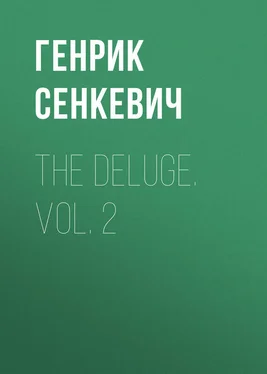Генрик Сенкевич - The Deluge. Vol. 2
Здесь есть возможность читать онлайн «Генрик Сенкевич - The Deluge. Vol. 2» — ознакомительный отрывок электронной книги совершенно бесплатно, а после прочтения отрывка купить полную версию. В некоторых случаях можно слушать аудио, скачать через торрент в формате fb2 и присутствует краткое содержание. Жанр: foreign_antique, foreign_prose, на английском языке. Описание произведения, (предисловие) а так же отзывы посетителей доступны на портале библиотеки ЛибКат.
- Название:The Deluge. Vol. 2
- Автор:
- Жанр:
- Год:неизвестен
- ISBN:нет данных
- Рейтинг книги:4 / 5. Голосов: 1
-
Избранное:Добавить в избранное
- Отзывы:
-
Ваша оценка:
- 80
- 1
- 2
- 3
- 4
- 5
The Deluge. Vol. 2: краткое содержание, описание и аннотация
Предлагаем к чтению аннотацию, описание, краткое содержание или предисловие (зависит от того, что написал сам автор книги «The Deluge. Vol. 2»). Если вы не нашли необходимую информацию о книге — напишите в комментариях, мы постараемся отыскать её.
The Deluge. Vol. 2 — читать онлайн ознакомительный отрывок
Ниже представлен текст книги, разбитый по страницам. Система сохранения места последней прочитанной страницы, позволяет с удобством читать онлайн бесплатно книгу «The Deluge. Vol. 2», без необходимости каждый раз заново искать на чём Вы остановились. Поставьте закладку, и сможете в любой момент перейти на страницу, на которой закончили чтение.
Интервал:
Закладка:
"We shall defend ourselves a week longer, two, three," thought to themselves some of the nobles and some of the monks; "but what farther, what end will there be to these efforts?"
The whole country was like a ship already deep in the abyss, and that cloister was peering up like the top of a mast through the waves. Could those wrecked ones, clinging to the mast, think not merely of saving themselves, but of raising that vessel from under the ocean?
According to man's calculations they could not, and still, at the moment when Zamoyski re-entered the hall, Kordetski was saying, —
"My brothers! if you sleep not, neither do I sleep. When you are imploring our Patroness for rescue, I too am praying. Weariness, toil, weakness, cling to my bones as well as to yours; responsibility in like manner weighs upon me – nay, more perhaps, than upon you. Why have I faith while you seem in doubt? Enter into yourselves; or is it that your eyes, blinded by earthly power, see not a power greater than the Swedes? Or think you that no defence will suffice, that no hand can overcome that preponderance? If that is the case your thoughts are sinful, and you blaspheme against the mercy of God, against the all-might of our Lord, against the power of that Patroness whose servants you call yourselves. Who of you will dare to say that that Most Holy Queen cannot shield us and send victory? Therefore let us beseech her, let us implore night and day, till by our endurance, our humility, our tears, our sacrifice of body and health, we soften her heart, and pray away our previous sins."
"Father," said one of the nobles, "it is not a question for us of our lives or of our wives and children; but we tremble at the thought of the insults which may be put on the image, should the enemy capture the fortress by storm."
"And we do not wish to take on ourselves the responsibility," added another.
"For no one has a right to take it, not even the prior," added a third.
And the opposition increased, and gained boldness, all the more since many monks maintained silence. The prior, instead of answering directly, began to pray.
"O Mother of Thy only Son!" said he, raising his hands and his eyes toward heaven, "if Thou hast visited us so that in Thy capital we should give an example to others of endurance, of bravery, of faithfulness to Thee, to the country, to the king, – if Thou hast chosen this place in order to rouse by it the consciences of men and save the whole country, have mercy on those who desire to restrain, to stop the fountain of Thy grace, to hinder Thy miracles, and resist Thy holy will." Here he remained a moment in ecstasy, and then turned to the monks and nobles: "What man will take on his shoulders this responsibility, – the responsibility of stopping the miracles of Mary Her grace. Her salvation for this kingdom and the Catholic faith?"
"In the name of the Father, Son, and Holy Ghost!" answered a number of voices, "God preserve us from that!"
"Such a man will not be found!" cried Zamoyski.
And those of the monks in whose hearts doubt had been plunging began to beat their breasts, for no small fear had now seized them; and none of the councillors thought of surrender that evening.
But though the hearts of the older men were strengthened, the destructive planting of that hireling had given forth fruits of poison.
News of the abdication of Yan Kazimir and the improbability of succor went from the nobles to the women, from the women to the servants; the servants spread it among the soldiers, on whom it made the very worst impression. The peasants were astonished least of all; but experienced soldiers, accustomed to calculate the turns of war in soldier fashion only, began to assemble and explain to one another the impossibility of further defence, complaining of the stubbornness of monks, who did not understand the position; and, finally, to conspire and talk in secret.
A certain gunner, a German of suspected fidelity, proposed that the soldiers themselves take the matter in hand, and come to an understanding with the Swedes touching the surrender of the fortress. Others caught at this idea; but there were those who not only opposed the treason resolutely, but informed Kordetski of it without delay.
Kordetski, who knew how to join with the firmest trust in the powers of heaven the greatest earthly adroitness and caution, destroyed the secretly spreading treason in its inception.
First of all he expelled from the fortress the leaders of the treason, and at the head of them that gunner, having no fear whatever of what they could inform the Swedes regarding the state of the fortress and its weak sides; then, doubling the monthly wages of the garrison, he took from them an oath to defend the cloister to the last drop of their blood.
But he redoubled also his watchfulness, resolving to look with more care to the paid soldiers, as well as the nobles, and even his own monks. The older fathers were detailed to the night choirs; the younger, besides the service of God, were obliged to render service on the walls.
Next day a review of the infantry was held. To each bastion one noble with his servants, ten monks and two reliable gunners were detailed. All these were bound to watch, night and day, the places confided to them.
Pan Mosinski took his place at the northeastern bastion; he was a good soldier, the man whose little child had survived in a miraculous manner, though a bomb fell near its cradle. With him Father Hilary Slavoshevski kept guard. On the western bastion was Father Myeletski, of the nobles Pan Mikolai Kryshtoporski, a man surly and abrupt in speech, but of unterrified valor. The southeastern bastion was occupied by Charnyetski and Kmita, and with them was Father Adam Stypulski, who had formerly been a hussar. He, when the need came, tucked up his habit, aimed cannon, and took no more heed of the balls flying over his head than did the old sergeant Soroka. Finally, to the southwestern bastion were appointed Pan Skorjevski and Father Daniel Ryhtalski, who were distinguished by this, that both could abstain from sleep two and three nights in succession without harm to their health or their strength.
Fathers Dobrosh and Malahovski were appointed over the sentries. Persons unfitted for fighting were appointed to the roofs. The armory and all military implements Father Lyassota took under his care; after Father Dobrosh, he took also the office of master of the fires. In the night he had to illuminate the walls so that infantry of the enemy might not approach them. He arranged sockets and iron-holders on the towers, on which flamed at night torches and lights.
In fact, the whole tower looked every night like one gigantic torch. It is true that this lightened cannonading for the Swedes; but it might serve as a sign that the fortress was holding out yet, if, perchance, some army should march to relieve the besieged.
So then not only had designs of surrender crept apart into nothing, but the besieged turned with still greater zeal to defence. Next morning the prior walked along the walls, like a shepherd through a sheepfold, saw that everything was right, smiled kindly, praised the chiefs and the soldiers, and coming to Charnyetski, said with radiant face, —
"Our beloved leader, Pan Zamoyski, rejoices equally with me, for he says that we are now twice as strong as at first. A new spirit has entered men's hearts, the grace of the Most Holy Lady will do the rest; but meanwhile I will take to negotiations again. We will delay and put off, for by such means the blood of people will be spared."
"Oh, revered father!" said Kmita, "what good are negotiations? Loss of time! Better another sortie to-night, and we will cut up those dogs."
Kordetski (for he was in good humor) smiled as a mother smiles at a wayward child; then he raised a band of straw lying near the gun, and pretended to strike Pan Andrei with it on the shoulders: "And you will interfere here, you Lithuanian plague; you will lap blood as a wolf, and give an example of disobedience; here it is for you, here it is for you!"
Читать дальшеИнтервал:
Закладка:
Похожие книги на «The Deluge. Vol. 2»
Представляем Вашему вниманию похожие книги на «The Deluge. Vol. 2» списком для выбора. Мы отобрали схожую по названию и смыслу литературу в надежде предоставить читателям больше вариантов отыскать новые, интересные, ещё непрочитанные произведения.
Обсуждение, отзывы о книге «The Deluge. Vol. 2» и просто собственные мнения читателей. Оставьте ваши комментарии, напишите, что Вы думаете о произведении, его смысле или главных героях. Укажите что конкретно понравилось, а что нет, и почему Вы так считаете.











